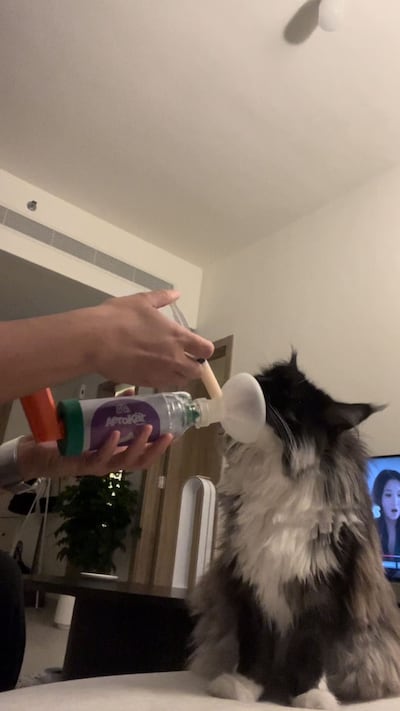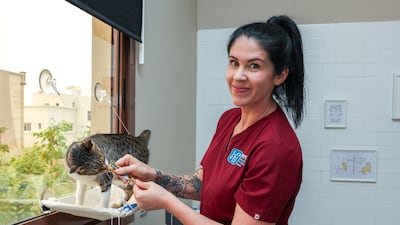The number of pets suffering respiratory problems caused by air pollution is increasing, experts have told The National, as owners treat them with makeshift incubators and inhalers costing thousands of dirhams a month.
Blowing dust and sand particles are common causes of poor air quality across the region, with pets enduring breathing difficulties as much as humans. Rhinitis and asthma are familiar complaints in humans, with pet owners reporting similar symptoms in cats and dogs.
Monthly costs to treat chronic breathing conditions can reach Dh2,500, with vets keen to encourage people to take preventive measures first to avoid high treatment bills.
“In my experience over the past 10 years, we've absolutely seen an increase in respiratory disorders in dogs and cats,” said Nora Shackleford, clinical manager at German Veterinary Clinic in Abu Dhabi, told The National.
“We assume maybe cats are a little bit protected from it because they mainly live indoors but it's important to remember the air quality outside can affect the air quality inside and we have definitely seen an increase in allergies and asthma.
“Also because brachycephalic breeds like pugs, French bulldogs and Persian cats are all popular here, they are more susceptible because of their obstructed airways. Air quality is definitely making a difference.”
Common signs
Wheezing, coughing and open-mouth breathing are all indicators of respiratory problems in cats. Animal treatment is similar to the way human conditions are managed, with nebulisers, inhalers and steroid tablets.
“The first line of treatment is always prevention, to avoid things that trigger a reaction,” said Ms Shackleford. “High-quality air filters at home can help, similar to kids with allergies, and can be quite effective.”
“Using the Air Quality Index can determine when to avoid the outdoors, for alerts that have shown it's dangerous for human health,” she added. “It's a good assumption that it would also be dangerous for their animals to be out in that.”
Air quality is checked across the UAE through several monitoring stations, including at the US Consulate in Dubai. Readings taken from an Air Quality Index can offer advice if those with existing respiratory problems should stay indoors.
When air quality is poor, vulnerable groups are encouraged to avoid exercising outdoors, close windows and wear a face mask.
In 2019, one in every six human deaths worldwide was attributed to air pollution, with pollution-caused mortality usually exposure to fine particulate matter.
By comparison, there is relatively little research on how air pollution impacts animal health, despite humans and animals sharing many of the biological pathways that lead to morbidity and mortality.
“We'll occasionally get clusters of dogs that will be sneezing with a watery nasal discharge,” said Dr Sam Westhead, from Amity Veterinary Clinic in Dubai.
“It is not necessarily mucoid, which might imply a bacterial infection, but just non-specific sneezing and also conjunctivitis in dogs, again in clusters around a certain area which suggests there may be some industry or factory nearby.

“But it could also be some sort of pollen that's been blown up and is affecting them.
“When I have checked the air quality indicator on my phone, I was a bit shocked to see Abu Dhabi seems to have poorer air quality than Dubai.”
How are pets with respiratory problems treated?
“We see lots of cases of respiratory disorders, but in many animals, it is hard to find an exact cause,” said Dr Amer Grizic, from the Amalia Veterinary Clinic in Abu Dhabi. “I suggest our clients clean their AC units and use a dehumidifier first to provide optimal air conditions and remove some of the dust.
“Medications are not always the answer, and cortisone should only be used once the cause of the symptoms has been identified. It should not be a long-term treatment. Maybe 30-40 per cent of cases are issues with dust in the air or pollution.”
Nadia Nazier, from Bahrain, who lives in Al Reef in Abu Dhabi, has a four-year-old cat with asthma, Kiza who she rescued from a car engine when she was just a few months old in 2020.
“Her asthma started with a hacking cough, which I thought was just a hairball,” said Ms Nazier. “But I noticed she never actually coughed anything up, so I thought maybe there was something underlying. I took her to the vet and they diagnosed her with asthma.
Kiza will need to use an inhaler for life, with the treatment costing about Dh400 for a three-week supply.
Another pet owner facing costly treatment bills is Tarryn Manoek, a South African occupational therapist who lives in Al Raha Beach. Ms Manoek rescued her seven-year-old cat Penelope, who was abandoned in May 2021.
“When I found her she had been kept outside for about a month and developed pneumonia,” she said. “She kept having reoccurring respiratory infections and was on multiple courses of antibiotics and corticosteroids.
“We quickly realised it was a chronic problem, that was when she was diagnosed with asthma.”
Ms Manoek faces a monthly vet bill for treatment of about Dh2,500 to cover consultations and medication costs.

Long term study
Research conducted in the UK by the Grantham Research Institute on Climate Change and the Environment found high levels of air pollution led to significant increases in the number of vet visits for both cats and dogs.
Improving air pollution would avoid 80,000 vet visits every year, the five-year study into more than seven million vet visits found.
Researchers combined data from veterinary practices, with hourly readings from air pollution monitors from UK Air from January 2017 to September 2022.
“Tackling air pollution is important for the climate, for health and the lives of our pets,” said Dr Stephen Jarvis, Assistant Professor in Environmental Economics at the London School of Economics.
“Improving the air we breathe could lead to huge savings in vet bills and cut out unnecessary stress for pet owners. The economic and emotional benefits are there, and these findings highlight that tackling air pollution doesn’t just benefit people, it’s good for our pets too.”


